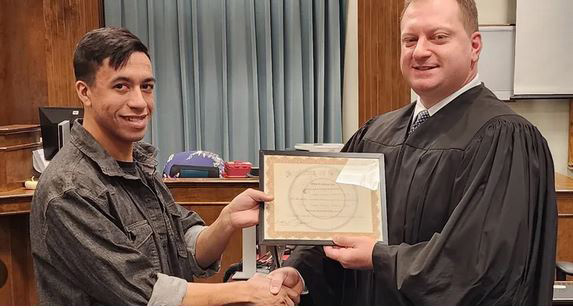
By Rick Cohler
Contributing Writer
BROWN COUNTY – The Brown County Veterans Court held its first session in March of 2012.
“I was reading a vets magazine and there were two articles in there,” former Brown County Executive Tom Hinz said. “One was about a Vietnam Vet who helped with the American Disabilities Act and the other was about a veterans treatment court started in Buffalo, N.Y. Hinz, Brown County Veterans Service Officer Jerry Polus, along with Brown County judges Kendall Kelly and Donald Zuidmulder were impressed by what they heard during a visit to a veterans court in Oklahoma.
“One of the participants told the court ‘I was a Marine and I did some dumb things when I got out of the service and if it wasn’t for this program I’d be dead.’ Another guy said ‘I came into this program and hated everyone in here. But I soon found out it’s veterans supporting veterans and I’ve now been sober for 13 months.’ That’s the key: veterans supporting veterans.”
Hinz has a long service in law enforcement, serving as an assistant chief in the Green Bay Police Department, then as Brown County Sheriff before being elected county executive.
Brown County Veterans Service Officer Joe Aulik pointed out that veterans have had unique experiences that the general population never have, they have unique traumas that the general population will never experience and they have unique benefits that the general population cannot access.
“Just basic training alone can shake your world,” Aulik said. “Sometimes people can’t navigate that. That’s when they encounter law enforcement, encounter our office, or suicide prevention and that’s why we are here to help them.”
He also pointed out that while in the military, there is a rigid structure to life.
“When you come out you lose that structure, that camaraderie; you lose your mission,” he added.
Veterans Court is overseen by Brown County Circuit Judge Beau Liegeois who served eight years in the Wisconsin National Guard as a military lawyer.
Judge Liegeois said he considers it an honor to preside over the court.
“This program gives individuals who served in our armed forces the opportunity to rehabilitate them in the community instead of just sitting in jail,” Judge Liegeois said. “We integrate local, state and federal veterans’ resources into the court so that everyone is at the table.
“The No. 1 benefit of this program is putting families back together. A lot of these veterans were disconnected from their families because of the underlying treatment issues and once they get their life sorted out they start rebuilding these relationships and it’s just awesome to see that develop over the months.”
There are a few differences between the Veterans Court participants and those in the other treatment court programs, according to Treatment Court Case Manager Blake Artis who notes most other participants are being given the second chance the treatment court provides because everyone deserves a second chance.
“Only in this court have the participants made a decision before they had all these issues to do something honorable for their country,” Artis said.
Another difference is that each participant is assigned a mentor from a group of volunteer veterans.
“The mentor gives them someone to who has shared some of the same experiences,” Hinz said. “You are a support person for that individual. You don’t have to match up Army to Army it’s just that having been in the service you can relate.”
Each Friday, participants appear before Judge Liegois. At a recent session, a participant named Robert addressed the court.
“When I started I was just like anyone else, he said. “I really didn’t care what happened to me. I was a little stressed about the requirements of the court but throughout the system and through my ‘OCD’ of preparedness I was able to build a structure.” Robert agrees with Judge Liegeois in that it allowed him to rejoin his family. “I was divorced from my wife due to my drinking but after the court ‘remarried’ my wife and got all six of my kids back in the house,” Robert recalled.
While the court’s purpose is to help veterans have a productive life, it’s not a cakewalk.
They still must abide by all the rules of their probation.
“The Department of Correction’s role is to make sure they are abiding by their rules of supervision,” Brandon Anderson of the Wisconsin Department of Corrections said. “In addition to normal supervision requirements, agents will work closely with a client on supervision to develop a case plan, targeting needs found in the assessment all guided by evidence-based practices.”
The specialty courts are unique in that in addition to normal supervision, agents act as liaisons and are also part of the specialty court teams.
“We’re part of the team,” Anderson continued. “We make recommendations based on incentives, rewards, program completion or termination discussions.”
It usually takes about 15 to 18 months to complete the program which has about a 75% success rate of keeping participants out of future trouble with the law.
Court participant Robert wants all veterans who are struggling to know that help is available to them if you’re willing to put forth the effort.
“There are a couple avenues they can take,” he continued. “One being the illegal substance avenue and the other to open up and being able to speak to people; being able to accept help and change.”
For more information, visit www.browncountywi.gov/departments/veterans-services or www.newvtc.org.
